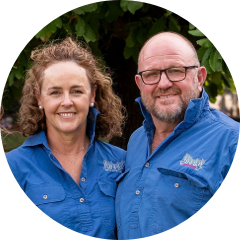Demonstrating ryegrass control strategies
Term
2023-2025
Project Officer
Matt de Roos
WHY THIS PROJECT IS NEEDED
A local GRDC National Grower Network industry meeting identified the management of ryegrass as a priority issue for northeast Victoria.
Cereals form a key part of the rotation for growers in the region, with anecdotal reports of increased ryegrass numbers in this phase due to limited control options. The situation has been exacerbated by poor trafficability in wet and waterlogged paddocks over recent years and excessively wet conditions have also impacted on pre-emergent weed control for some product uses. Consequently, there is interest in exploring management strategies in other phases of the rotation, to drive down ryegrass numbers.
In short: This project is evaluating diverse ryegrass management strategies, with the aim of enhancing crop yield and combating herbicide resistance.
Another consideration is changes in dormancy of annual ryegrass, leading to staggered germination. This is likely a response of local ryegrass populations adapting to control measures and timings. Significant crop yield losses due to the competitive nature of annual ryegrass and the high input costs required to manage this and prevent ongoing seed set, make this an economically significant issue for local growers.
Project focus
Riverine Plains has established a demonstration trial at Wahgunyah to demonstrate the effectiveness of integrated weed management strategies for control of annual ryegrass. The trial is assessing various ryegrass control strategies over the 2023–2024 growing seasons and will evaluate chemical and cultural management techniques on ryegrass numbers.
Ryegrass populations will be assessed for each treatment at early, mid and late stages of crop development and crop yield will also be measured.
Project outcomes
Various extension and communication activities are helping to increase the understanding of the different management strategies available for annual ryegrass populations and herbicide resistance across the region.
Summary results from the two-years of project trials at Wahgunyah were published in Research for the Riverine Plains, 2025
Key messages were:
- A trial at Wahgunyah showed a no till treatment had extremely low ryegrass numbers throughout 2024, compared to treatments that received a speed till (autumn tickle).
- A ryegrass “blowout” in a previous crop can cause a legacy effect; this can take time and multiple strategies to manage effectively.
- A “high-level chemistry” approach can be high cost and high risk if conditions aren’t suitable at the time of application. In this trial, there was a trend to decreasing ryegrass numbers when the sowing rate was increased by 50 percent for canola sown in 2024.
- In 2024, ryegrass seed testing indicated resistance to Hoegrass (Group 1, fops) and in 2025, resistance to Roundup (Group 9) and Glean (Group 2, sulfonylurea), was also detected, highlighting how resistant populations can develop over time.
- Herbicide resistance testing can inform farmers about the likelihood of a herbicide failure or reduced effectiveness ahead of sowing; if resistance to a herbicide group is detected, farmers can switch to a different group or alter their crop rotation or variety choice.
- Non-chemical (cultural) methods of ryegrass control such as choosing a cultivar with a growth habit adapted to the region, increasing seeding rates, cutting hay to prevent ryegrass seed set, grazing, burning and harvest weed seed control can help manage ryegrass populations.
Read the full article: Demonstrating ryegrass control strategies trial - results from north east Victoria
A brief summary of results from the project's 2023 trials were published in Research for the Riverine Plains, 2024.
Key messages were:
- Integrating a range of locally validated weed management strategies is important when tackling annual ryegrass.
- Rotating crop types and chemistry are vital components of all weed and disease control strategies.
- It is important to also consider non- chemical weed control strategies, due to the increasing rates of herbicide resistance being seen in local ryegrass populations.
- Seed testing indicated ryegrass resistance to Group 1 herbicides at the trial site.
Further reading
Find out more
For further information, please contact Riverine Plains Field Trial Manager, Matt de Roos at matthew@riverineplains.org.auProject investment
This is an investment of the Grains Research and Development Corporation (GRDC).
Focus areas
MORE ON Grains & Sustainability
Our research enhances food production, increases environmental resilience and improves community connection across the Riverine Plains. See how our research creates impact.
-
Grains
Sustainability
-
Business
Sustainability
-
Livestock
Sustainability
-
Grains
Business
-
Grains
Sustainability
-
Grains
Livestock
-
Grains
Livestock
-
Soils
Sustainability
-
Soils
Sustainability
-
Grains
Sustainability
-
Grains
Business
-
Sustainability
Drought
-
Sustainability
-
Grains
-
Grains
-
Soils
Grains
-
Soils
Sustainability
-
Grains
Soils
-
Drought
Grains
-
Soils
Grains
-
Grains
-
Grains
Soils
-
Soils
Grains
-
Fodder
Grains
-
Grains
-
Soils
Sustainability
-
Grains
-
Soils
Sustainability
-
Grains
Soils
-
Sustainability
Grains
-
Grains
Sustainability
-
Soils
Grains
-
Grains
Sustainability
-
Livestock
Grains
-
Grains
Soils
-
Sustainability
Grains
JOIN RIVERINE PLAINS
Riverine Plains provides opportunities to see new research and innovation, connect with rural communities, and attend informative events.


